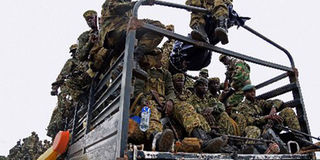300 killed in latest S Sudan unrest, says UN

Uganda military personnel are seen atop military and police trucks driving towards Juba, South Sudan, at Nimule border point on July 14, 2016. Machar’s sacking as vice-president in 2013 set off a cycle of retaliatory killings that split the poverty-stricken, landlocked country along ethnic lines and drove more than two million out of their homes. PHOTO | AFP
What you need to know:
- According to the UN, there were some 114,000 South Sudanese refugees in neighbouring countries before December 2013, but that figure has ballooned to 835,000 now.
- Violence erupted in Juba last week after a misunderstanding between guards protecting President Kiir and Machar.
GENEVA, Friday
At least 300 people have been killed in four days of intense gun battles in the capital of South Sudan and 42,000 have fled the city, the UN said today.
The recent violence in Juba echoed the fighting that triggered the civil war and marks a fresh blow to last year’s peace deal to end the bitter conflict that began when President Salva Kiir accused ex-rebel and now Vice-President Riek Machar of plotting a coup.
“It’s over 300 deaths since July 8,” said World Health Organization spokesman Tarik Jasarevic. The UN, however, said it did not have the number of those injured.
The July 8-11 violence had left “42,000 internally displaced” in the world’s youngest nation, said William Spindler, the spokesman for the UN refugee agency.
“The number of refugees in neighbouring countries is now 835,000,” he said.
However, the International Organisation for Migration said many people were returning.
“Humanitarian access to affected people has improved dramatically since Monday. But this can only be sustained if the ceasefire holds”, said John McCue, IOM South Sudan head of operations.
Machar’s sacking as vice-president in 2013 set off a cycle of retaliatory killings that split the poverty-stricken, landlocked country along ethnic lines and drove more than two million out of their homes.
The conflict has been characterised by horrific rights abuses, including gang rapes, the wholesale burning of villages and cannibalism.
According to the UN, there were some 114,000 South Sudanese refugees in neighbouring countries before December 2013, but that figure has ballooned to 835,000 now.
Ethiopia said today it was ready to send more soldiers to strengthen the UN peacekeeping mission in South Sudan.
“We’re more than willing to take on our part of the responsibility to restore calm in South Sudan,” said government spokesman Getachew Reda.
“We hope and expect the South Sudanese to bury the hatchet,” he said.
CEASEFIRE
Dozens of Sudanese women and children arrived in Khartoum from Juba today as Sudan began evacuating its nationals from South Sudan, which split from the north five years ago.
At the same time, a political row has erupted between factions in South Sudan’s transitional government after President Kiir controversially sacked a minister from one of the groups that signed the peace agreement.
Dr Cirino Hiteng was fired a day after attending an emergency Intergovernmental Authority on Development (Igad) meeting in Nairobi to address the eruption of violence in South Sudan.
But Juba, sources said, was unhappy with the resolutions made by the Igad Council of Ministers, to which Dr Hiteng appended his signature.
The council asked the South Sudan Government to immediately reopen the main airport in Juba, and let it be guarded by peacekeeping forces under the United Nations Mission in South Sudan (Unmiss).
“The council demands an immediate ceasefire; reopening of Juba International Airport, to be protected by Unmiss; and an immediate return of all armed forces and weapons to their barracks,” Ethiopian Foreign minister Tedros Adhanom told reporters in Nairobi.
Violence erupted in Juba last week after a misunderstanding between guards protecting President Kiir and Machar.
Both leaders have been calling for calm, but their lieutenants have been trading accusations on who caused the violence.






